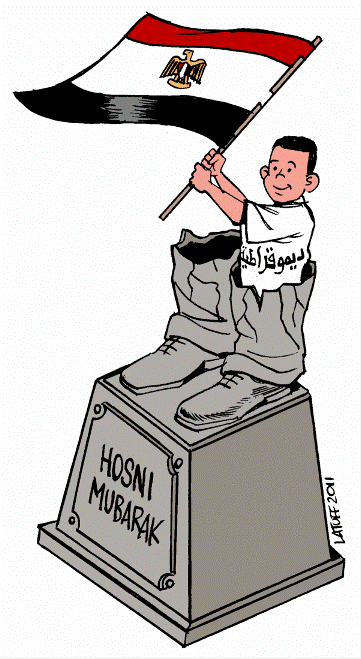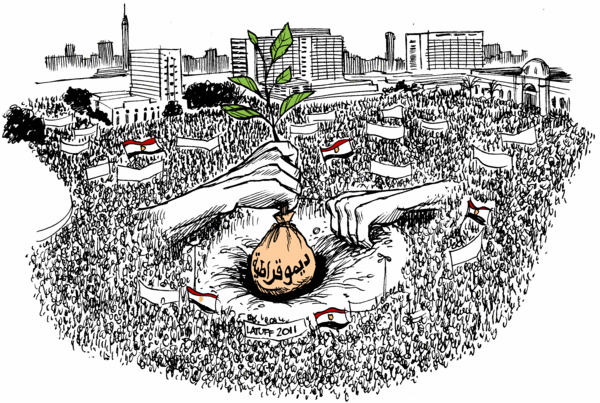Once Egypt's 2011 revolution concluded, the Brazilian blogosphere was filled with analysis, celebrations and prognoses for the future. In fact, from January 25 the whole world followed the course of the conflict in Egypt, awaiting the fall of then President Hosni Mubarak, which finally arrived on 11 February after weeks of protest and 32 years of dictatorial government.
Brazilian blogger reactions
Georges Bourdoukan had no doubts [pt] that the demonstrations, which gathered thousands, maybe millions all over Egypt, could be called a revolution:
Um milhão de pessoas protestando já não é mais manifestação, mas revolução.
Uma revolução que não necessita utilizar armas para se fazer ouvir.
One revolution that does not need to use weapons to be heard.
The crackdown on the protestors was extreme, to which Lucas Santos said [pt]:
Por esse número elevadíssimo de agentes de coerção interna, vê-se que o maior inimigo de Mubarak é o próprio povo egípcio.
Not only the Egyptian people were targets of the repression, but also international journalists. Danilo Marques reported [pt] about Brazilian journalists that were arrested and ill-treated [in Egypt]:
houve relatos de ataques a vários jornalistas, que foram agredidos, abordados, um esfaqueado e o caso dos jornalistas brasileiros, como Corban Costa da TV Brasil. “Eu passei 18 horas em uma sala escura e sem janela. Achava que ia ser executado a qualquer momento“.
Cameraman Gilvan Rocha was another Brazilian media arrested and assaulted [pt] in Egypt. Journalists were blindfolded, bound and abused until they were released through the intervention of the Brazilian embassy in Cairo.
Mirgon Kayser, for the blog Jornalismo B, wrote [pt] about fear, the instrument of domination of dictatorships:
Sob os pontos de vista humanitário, humanista, democrático, é evidente que esse processo, embora ceifando vidas, gerando caos e tensão, trará o alvorecer de novas sociedades nesses países. Os regimes ditatoriais podem ter os mais variados formatos, mais ou menos liberdade, mais ou menos pobreza, mais ou menos violência. O único elemento de que nenhum deles prescinde é o medo. Somente através do medo, um punhado de homens pode controlar a seu bel prazer o destino de milhões. Tunisinos, egípcios e iemenitas perderam justamente aquilo que lhes tolhia, que lhes calava: o medo.
Brazilian perspective and foreign policy
Eduardo Guimarães criticized [pt] Brazil's national media coverage of the Egypt crisis:
De repente, não mais do que de repente, os brasileiros descobriram um país chamado Egito, suas contradições e o sofrimento do seu povo, imposto por um regime ditatorial a que está submetido desde 1981, há exatos 30 anos, por obra e graça do ditador Mohamed Hosni Mubarak, quem, durante esse tempo todo, só disputou eleições consigo mesmo.
Brazilian foreign policy has also been criticized. The Foreign Ministry has been accused of being negligent and reticent in the statement [pt] it sent to the Egyptian press about the crisis and the repression against the people.
There was no shortage of criticism [pt] of the American position: they were considered the main culprits [pt] of perpetuating the dictatorial regime [pt] of Hosni Mubarak, as was Israel, for the support they gave [pt] to the dictator.
Professor Ubiracy de Souza Braga, at the blog Espaço Acadêmico (Academic Space) listed the reasons [pt] for the protests, analyzing the Egyptian social situation:
Atualmente, 80 milhões de pessoas vivem no Egito. Dois terços são jovens com menos de 30 anos – e 90% deles estão desempregados; 40% da população vivem com menos de dois dólares por dia. É o país árabe mais populoso, têm liberdades políticas limitadas e graves problemas sociais, incluindo, pobreza, desemprego, forte preconceito étnico e racial por parte dos Estados Unidos da América – EUA, alta taxa de analfabetismo, além de vários escândalos de corrupção administrativa.
Besides the issues of unemployment and other social problems, Francisco Bicudo pointed to [pt] the lack of freedom as another major reason for the upheaval in Egypt, whose presidency was assumed by Hosni Mubarak in October 1981, when President Anwar El-Sadat was assassinated.
After the dictator's defeat on 12 February, 2011, Leonardo Sakamoto spoke [pt] of the strategic importance of the country:
Tem um dos maiores exércitos profissionais da região, possui localização estratégica (entre a África e a Ásia, o Índico e o Mediterrâneo, com o canal de Suez encurtando distâncias), é – até agora – um parceiro importante de Washington, mantendo relações cordiais com Tel-Aviv.
What is the role of Islamic groups?
One subject widely reported in Brazil was the possible rise of the Muslim Brotherhood to power – and of other Islamic groups in the Middle East – which aroused some Islamophobia. The Muslim Brotherhood is the only opposition party to elect representatives to the Egyptian parliament and is an undisputed national strength.
Hugo Albuquerque said [pt], comparing the Egyptian situation with the Algerian one (another country also influenced by the revolutionary wave, whose dictator, Abdelaziz Bouteflika, has been in power since 1999):
De fato, existem grupos religiosos importantes e beligerantes como a Irmandade Muçulmana no Egito e a Frente Islâmica de Salvação na Argélia, o que é um considerável combustível de risco – e o que pode, de fato, dar um caráter diferente para eventuais derrubadas dos regimes locais. Claro, isso não esgota, de modo algum, a legitimidade das reivindicações contra os regimes de Mubarak no Egito ou de Bouteflika na Argélia, mas apenas apresentam sim um fator de risco real inerente à sua eventual (e quem sabe necessária) derrubada.
The past tells the future
Georges Bourdoukan found similarities [pt] between the Egyptian revolution and the end of the Brazilian Military Dictatorship (1964-1985):
A diferença entre o nosso 64 e o 2011 dos egípcios, é que o mundo tornou-se muito pequeno e como disse aquele barbudo [Karl Marx], ainda no século 19, a história só se repete como farsa.
Dai porque precisamos ficar atentos para evitar os erros do passado e avançar cada vez mais em busca de uma sociedade mais humana e mais solidária.
Hence why we must be careful to avoid past mistakes and move increasingly in search of a more humane society with greater solidarity.
Gunter Zibell pointed out [pt] possible post-Mubarak scenarios in Egypt and throughout all the [Middle East / North African] region:
- como a maioria dos regimes não foi eficaz no desenvolvimento social, surge potencial para oposição pelo lado fundamentalista; – a simpatia aos EEUU (e OTAN em geral) pode vir a ser decrescente. Note-se que raramente convulsões levam a sentimento pró-americano; – monarquias podem enfrentar problemas inéditos; – a inserção de Israel fica mais complexa;[…] – as repúblicas de maioria islâmica da ex-URSS (Cazaquistão, etc.) podem finalmente vir a se posicionar na região, pois também não são exemplos de prosperidade democrática; – Rússia pode encontrar caminhos para recuperar alguma influência;
- as most of the regimes were not effective in social development, there is potential for opposition by fundamentalists – sympathy towards the US (and NATO in general) might be decreasing. Note that unrest rarely leads to pro-American sentiment – monarchies may face new problems – the inclusion of Israel grows more complex; […] – the majority of Muslim republics in the former USSR (Soviet Union – Kazakhstan, etc.) may finally come to stand in the region because they are also not examples of democratic prosperity – Russia may find ways to regain some influence;
Danilo Marques questioned [pt] the possible spread of the protests:
Dezoito dias não foram nada. A vontade da população era soberana. A queda de Mubarak era apenas questão de tempo. […] Há muitos outros tiranos a serem derrubados no Oriente Médio, na África como um todo. O exemplo de resistência egípcia deve ser entendido por nós como um passo para outro panorama mundo, não só no Oriente Médio, pois é uma resistência ao que existe de políticas conservadoras, voltadas como um capacho para uma economia imperialistas e pisoteando seus compatriotas.








